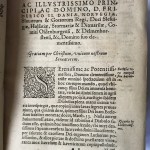WIGAND, Johannes [with] SEINECKER, Nikolaus. De sacramentarijsmo, dogmata et argumenta ex quatuor patriarchis sacramentariorum…
Leipzig, Georgius Defnerus, 1585
£ 2,000
4to, ff. 16, 582, α-β8 A-3F8 3G6 3H-4D8 (Ggg6 blank). Mainly Italic letter, some Roman, sporadic Greek and Hebrew words. Large decorated initials, head and tailpieces. Oval vignette within a floral border of a female figure holding a sceptre flanked by a lion, architectural view in the background, on title page with motto “virtute, labore et constantia”. Second t-p marked with old metal clip on margin (Hhh1): “Exegesis colloquiorum aliquot, cum sacramentariis habitorum”, imprint dated “1584”. Verso of final leaf with large elaborate woodcut of Christopher bearing Jesus with inscribed biblical verse (“Fortitudo mea et laus mea Jehoua et factus est mihi in salutem Exodi 15”) and repeated imprint. Two library stamps on t-p of Christ College and the theological library of Aberdeen University, occasionally repeated throughout. “Of the Jesuit College of Munich” in early Latin handwriting on t-p and earlier shelf mark on front endpaper, plus another later label with library no. Bound in contemporary limp vellum, yapp edges, remains of ties and gilt stamped coat of arms of Johannes Georg von Werdenstein (1542-1608) at centre of both covers. Ink title to spine. Evenly though lightly browned throughout. A fine copy with a prestigious provenance.
Johann Wigand (1523-87) was a German Lutheran cleric and theologian. He served as Bishop of Pomerania and took part in the Reformers’ debates about sacraments, which focused on the issue of the Lord’s Supper. The participants to these debates were important theologians from different branches of the Reformation. The Lutherans – such as Johannes Brenz, Niels Hemming, Nikolaus Amsdorf and Tilemann Hesshusen – were opposed to the representatives of Reformed confessions, such as John Calvin, Heinrich Bullinger, Theodore de Beze, Pier Martire Vermigli, Jan Laski and Valerand Poullain. In this work, Wigand illustrated and countered the arguments of Karlstadt, Zwingli, Oecolampadius and Calvin.
The owner of this book was Johann Georg von Werdenstein (1542–1608), canon of Augsburg and Eichstätt, who collected a very substantial library consisting of tens of thousands of books. Werdenstein came from an aristocratic family and entered the Catholic Church, becoming a canon of Augsburg Cathedral in 1563, and adding a further canonry at Eichstatt in 1567. Around 9,000 volumes from his library including many musical items were purchased in 1592 for 6,000 florins by the Duke of Bavaria, for the Ducal Library in Munich, now the Bavarian State Library.
Bibliography: Adams W1578.






